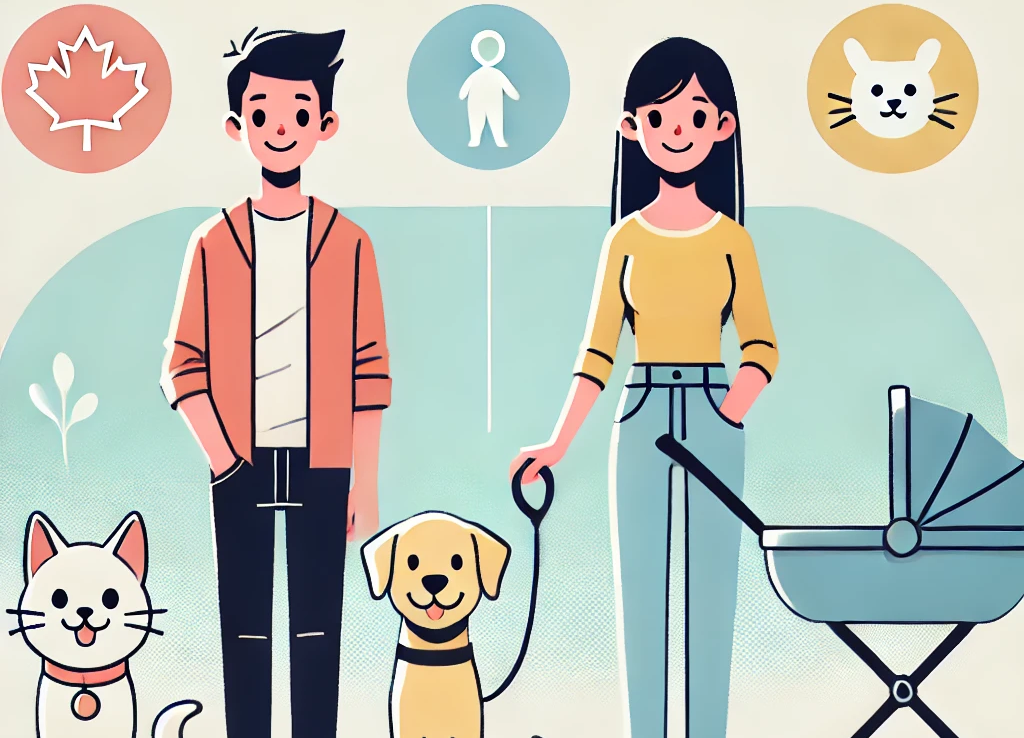If you’ve been noticing more dogs in strollers than babies, you’re not imagining it! The family portrait is changing in Canada as more and more young Canadians are choosing pets over kids. According to a recent survey, many Millennials and Gen Z members want homes and pets rather than weddings and children. This preference reflects a significant cultural shift, one that’s making many wonder: What happened to the traditional Canadian dream of family and kids?
Why the Canadian Dream Is Going to the Dogs
It's not just about lifestyle choices—rising costs and economic uncertainty are pushing many young people away from starting families. With inflation making everything from housing to groceries more expensive, adding a child to the mix can feel daunting. It’s a lot easier to afford kibble than diapers.
In fact, economic pressures are a key driver behind this trend. Today’s young adults are grappling with student debt, high rents, and a competitive job market. Many women, in particular, are choosing to delay starting a family to focus on their careers and achieve a sense of financial stability first. The result? More people are choosing four-legged companions instead of starting a family right away.
The Numbers Don’t Lie
Canada has recorded its lowest fertility rate for the second year in a row, and it’s more than just a statistic—it’s a wake-up call. More families are choosing to have fewer children or none at all, leaving many to wonder about the country’s future demographic balance. Without a steady rate of births, Canada could face significant challenges in areas such as workforce availability, healthcare, and social services in the years to come.
Why Pets Seem Like a Safer Bet
So, what’s making pets so appealing? The reasons are simple. Pets are relatively low-maintenance in comparison to raising a child. There’s no need for daycare, no college funds, and no high school rebellion phase. Pets fit more seamlessly into a fast-paced lifestyle, offering companionship, emotional support, and a sense of purpose—without the lifetime financial and emotional commitments that come with kids.
For those living in tiny apartments or dealing with unpredictable work schedules, pets like cats and dogs offer love and companionship without the added pressures and sacrifices of parenting. And let’s be honest—taking a dog to a café or on a weekend trip to the mountains sounds a lot more fun than lugging a diaper bag everywhere you go!
What Can We Do About It?
Is there a solution? Should we be trying to convince people to have more kids, or do we just let everyone embrace their inner pet parent? While there’s no quick fix, some strategies could help address the root causes behind this shift:
- Make Parenting Affordable Again: One of the main reasons young Canadians are opting out of parenthood is financial stress. By offering better parental leave, affordable childcare, and housing support for young families, the government can make raising kids seem more doable and less like an economic gamble.
- Promote Work-Life Balance: Creating a family-friendly work environment is key. Flexible work hours, remote work options, and benefits that support parents can go a long way in making the idea of starting a family more attractive.
- Normalize Diverse Lifestyles: Not everyone needs or wants a traditional family structure, and that’s okay! Society should recognize and support different lifestyle choices. Whether it’s focusing on a career, traveling, or becoming the best pet parent ever, all choices should be valid and respected.
Final Thoughts
The shift towards prioritizing pets over kids isn’t just about dollars and cents—it’s about values, lifestyle, and what makes people happy. Young Canadians are crafting their own version of happiness, one that often includes a wagging tail instead of a crying baby. This trend might be worrisome for policymakers, but it’s rooted in a genuine desire for stability, emotional connection, and—let’s be real—a less chaotic life.
Whether society should be worried depends on whether we’re willing to adapt to these changing dynamics. Until then, expect to see more dogs on social media profiles than diaper-changing updates. After all, pets might just be the new “kids” of the 21st century.

